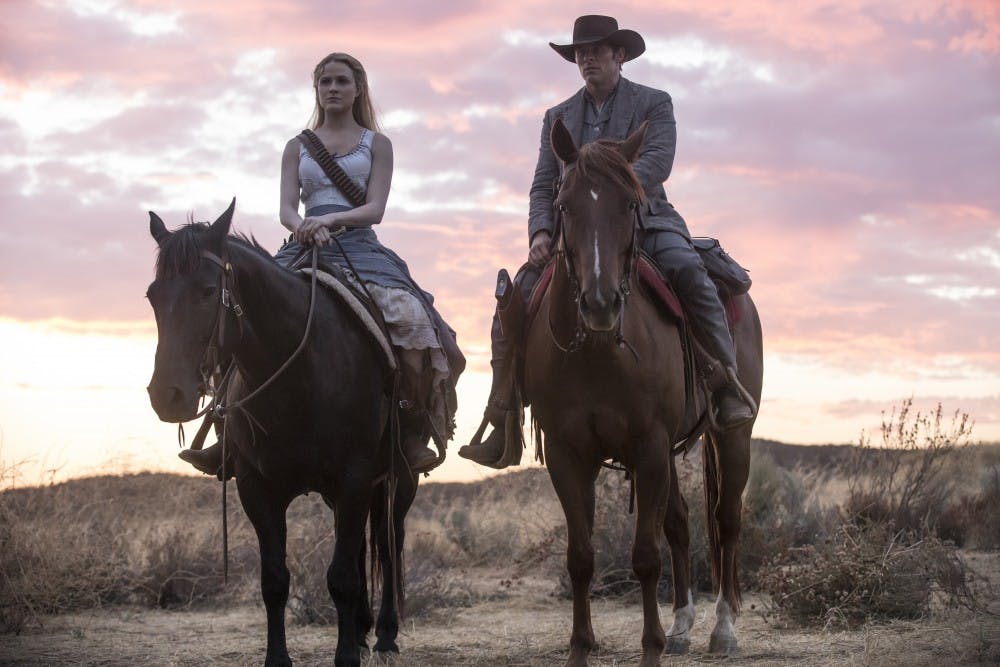Showrunners Lisa Joy and Jonathon Nolan’s blockbuster television series "Westworld," a small screen adaptation of Michael Crichton’s novel of the same name, galloped onto television screens a year and a half ago. To the probable excitement of every creative and shareholder associated with HBO, it did so grandly. "Westworld" asserted itself as the inevitable “Game of Thrones” replacement they wanted and needed to be.
The series played out like a high-concept “Jurassic Park,” mixed with ample doses of “True Grit” and “Django Unchained” and tinged with the singular robo-existentialism one can only find in “Blade Runner.” "Westworld" follows a large cast of characters in a high-tech amusement park created to simulate the wild, Wild west and allow patrons to satisfy their darkest urges.
Of course, nothing went well.
Crichton, author of both “Jurassic Park” and “Westworld,” is clearly no stranger to high-tech theme parks gone rogue. “Westworld’s” inaugural season and the original “Jurassic Park” play out in similar fashion, distinguished predominantly by differing brands of chaos and thematic depth.
But what distinguished Nolan and Joy’s loose adaptation of Crichton’s novel, beyond its trademark HBO-levels of sex, blood and hyperviolence, was the annoying, fetishistic revelry with which it sanctified narrative and trivialized character. The series kept audiences guessing, but its cataclysmic reveals often came at the expense of compelling character-based storytelling.
“Westworld's" season two premiere promises to move beyond those things. It’s a riveting piece of television in its own right, much like the first season’s premiere was, but it feels more organic and stylistically freewheeling. It reads as less bogged down by timeline twists and identity reveals.
Its questions are bolder. It’s more deep-cutting in its introspection. It’s twice as thoughtful and three times as insane. But perhaps most significantly, its characters finally take precedence over plot.
With its sophomore season premiere, “Westworld" promises an exhilarating 10-hour odyssey of unbridled chaos and profound introspection in this sci-fi-soaked wild, Wild west.
The first episode of season two is entitled “Journey into Night,” which feels like an appropriate designation narratively and thematically. The show picks up in the aftermath of the cataclysmic revelations and events that punctuated the finale of "Westworld's" first season.
The series’ treatment of plot feels markedly different here. The mysterious allure of the park is gone, and thankfully the showrunners don't ration out vital exposition as big reveals anymore. Instead, the episode’s narrative merely follows key characters as they carve out a place for themselves in the lawless wasteland the park has become.
Most significantly, the creators finally empowered female characters like Maeve and Dolores, played by Thandie Newton and Evan Rachel Wood, who have always felt destined to be the series’ real stars. Both actresses excel in their roles, and it feels refreshing to see the series have such dynamic character arcs.
Most of the episode’s best sequences and standout moments come from Dolores and Maeve’s separate storylines, but there’s also an incredibly compelling narrative shaping up for Jeffrey Wright’s character, Bernard. Like season one, the sequences involving behind-the-scenes drama remain more thematically compelling than what goes on in the park. What looks to be one of the series’ most substantive narrative strands blurs the lines between park and non-park story threads.
In the process, all facets of the story feel significantly improved, imbued with a greater sense of thematic purpose. They are decidedly less clunky than the bouts of existential ponderings that punctuated season one.
There’s also more verve, more flair that comes from the sequences focused on Bernard. The opening scenes of the episode play out in almost psychedelic fashion, as if we’re witnessing fragments of memory scattered about like puzzle pieces. That fractured, dreamlike, formal style feels refreshing, but also fitting. It’s never gimmicky and always invigorating.
Unfortunately, there’s also some degree of discordance between the series’ disparate narrative threads. Presumably they’ll all coalesce at some point, but throughout the premiere it can be a bit exhausting to try to process.
This feels like more of a mild irritant than a significant issue. The variety of narrative threads in the first episode feels warranted in order to satiate the desires of fans and fill in the gaps left by season one.
“Westworld” season two seems poised to trump season one in nearly every way. It’s riveting and exhilarating, but thoughtful as ever. It takes the best elements of season one and runs with them, remedying lesser components as it goes.
I’ve no doubt that “Journey into Night” will offer diehard fans and casual viewers everything they’ve been yearning for, but what makes it so special is how bold it’s willing to be in the process.
If season one was “Mad Max,” then season two is “The Road Warrior.” All we can do is saddle up.




